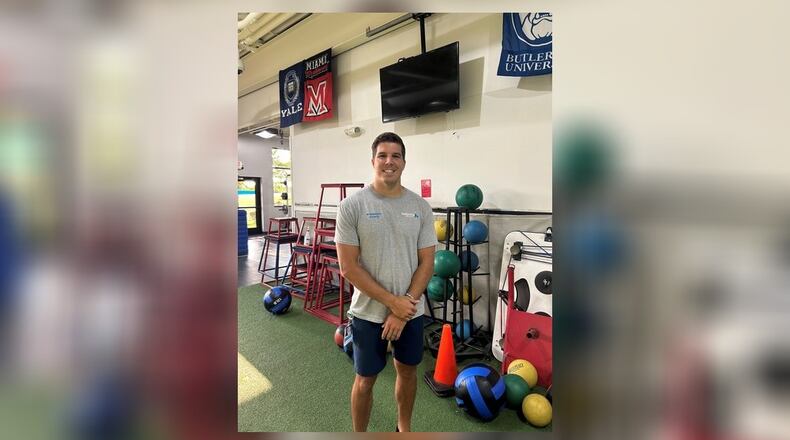Exercise physiology focuses on maintaining current physical abilities related to strength, aerobic capacity, flexibility, etc. Carpenter’s work focuses on strength training.
Loss of mobility, function and independence can be some challenges people face as they get older. According to Carpenter, exercise physiology can help combat some physical problems.
“It’s important to talk to your doctor,” Carpenter said. “We’re all very different and our needs are individualized, so it’s best to find someone who knows what they’re doing to teach you how to be safe. If you’re starting out, take it slow and work on form and technique. I usually start people with a body-weight squat or a leg press.”
Chronic conditions and mobility issues can impact abilities, but Carpenter notes there are ways to overcome such challenges.
“There are ways to strength train to work around limitations,” he said. “Mobility can change as people get older, and if someone weight lifts, a safety bar could be an option. Weighted vests are also options for people who are just starting to work on the strength training. Use the gym to mimic exercises, like squatting.”
Jeanne Gorrell, of Kettering, started working with Kettering Health after she noticed her balance “isn’t what it used to be.”
“There are exercises that can help with that and my balance is better,” she said.
Gorrell, 79, has also seen an improvement in her strength and flexibility.
“As you get older, all your joints tend to stiffen up, whether it’s standing or getting up in the morning and the exercise really helps with that,” she said. “I feel better throughout the day. I feel more energy and mentally it helps me feel good about myself.”
Gorrell said working with someone one-on-one helps her stay motivated, and that continues outside of the exercise program. She tries to walk 10,000 steps a day.
“I’m going to continue indefinitely. We use a variety of equipment and exercises, so it doesn’t get boring,” she said. “I suggest people stay active. If you don’t like one thing, try something else. You have to find something that works for you. Get started, even if it’s just walking.”
Gorrell said she also has explanations and pictures for exercises at home.
Push ups and squats are simple at-home exercises that can help regain strength. Carpenter also recommends an exercise called the dead bug, for core and trunk stability.
“You can get stronger in your 60s and 70s and enjoy your life and do things you could do in your 30s and 40s,” he said. “It takes hard work and consistent training. There is no magic pill. It has to be a consistent effort over time.”
Carpenter shares more advice:
How does the body change as a person ages?
Muscle loss (sarcopenia), bone density loss (osteopenia), frailty, metabolic syndrome - visceral obesity, insulin resistance, hypertension, inflammation.
What are some of the ways aging can affect daily life?
Loss of function and independence.
How can exercise physiology help combat this?
Exercise is medicine. Exercise must be safe, have a broad and comprehensive range of dosing, must be effective to combat aging symptoms, and exercise should be simple and efficient.
How does exercise physiology help with strength and stamina?
Strength training helps combat the aging symptoms and is the most comprehensive training. Can help give more strength and stamina to do daily tasks and gain independence back.
Any tips?
The Barbell Prescription is a good resource, and it was written by a doctor.
Contact this writer at writeawayk@gmail.com.
About the Author

